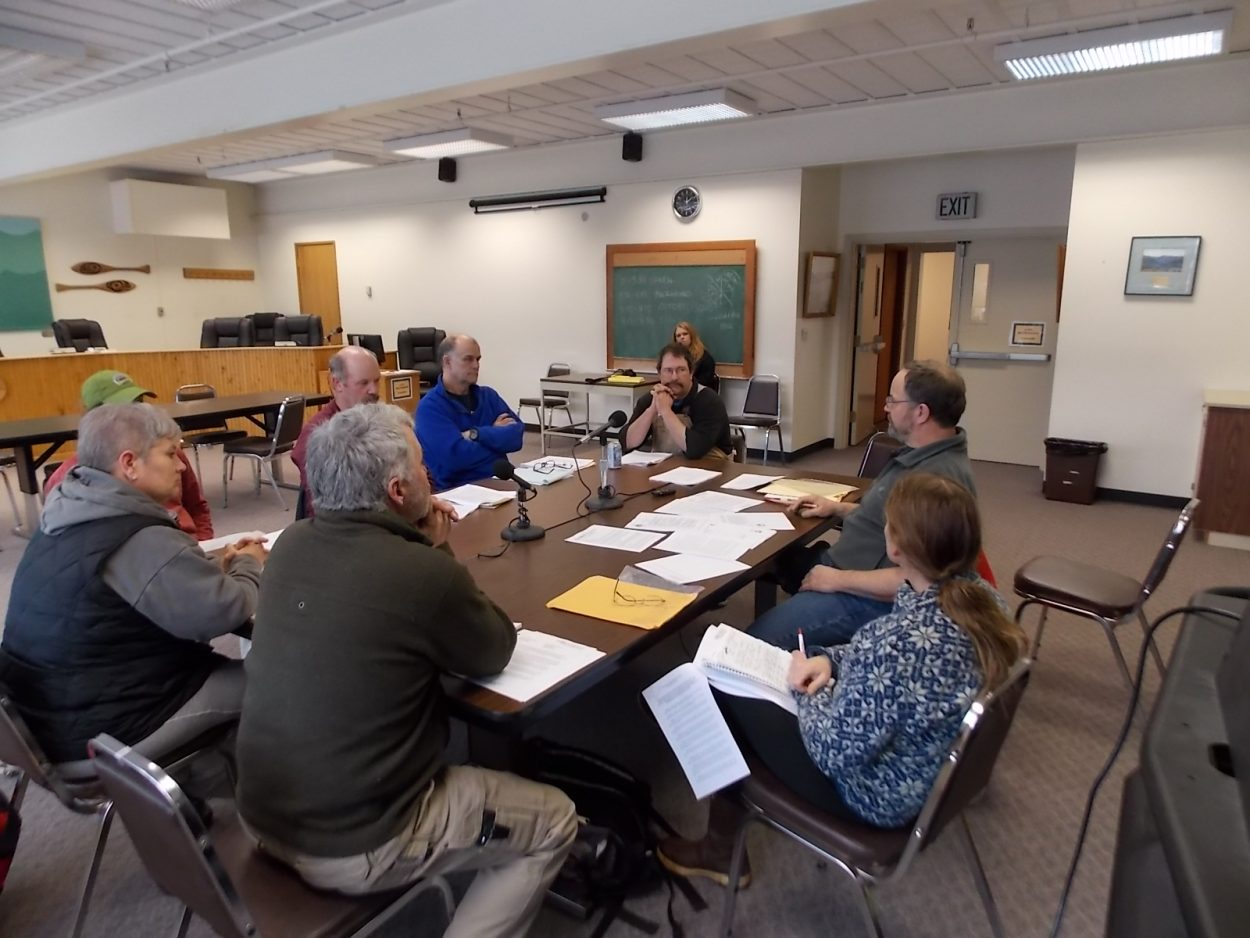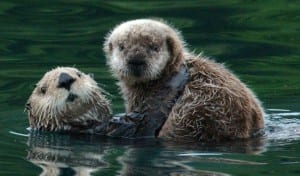A committee of fishermen and other Petersburg residents is wrestling with what to do about the impact of a growing sea otter population on Southeast’s commercial crab and dive fisheries. The Borough Assembly appointed the ad hoc committee this month after choosing not to endorse proposed legislation that would put a bounty on the animals. The Committee had a wide-ranging discussion during its first meeting Friday. Matt Lichtenstein has more:
For mobile-friendly audio, click here.
When he signed up for the committee, commercial crabber Andy Knight thought the group would be discussing whether or not the borough would support Senator Bert Stedman’s bill. The measure would pay native hunters a hundred dollar bounty for every sea otter they kill. Otters are federally protected and may only be hunted by Alaska Natives.
While he acknowledged the otter issue was complicated, Knight suggested focusing on a simple question, “Are we going to support our commercial fishing community or not?”
No one debated the importance of supporting the town’s lifeblood industry but some of the other committee members didn’t think a bounty would accomplish that.
“I’ve always intended on supporting the commercial fishing industry but I personally don’t think Stedmans Bill is the way to go,” said Kurt Wohlheuter, a fisherman and assembly member who chairs the committee.
For one thing, Wohlheuter was concerned such a bounty would conflict with the federal Marine Mammal Protection Act. As an alternative, Wohlheuter pointed to the Sealaska Heritage Institute’s approach. The has a program that teaches Alaska Natives how to process and sew otter hides. It’s also urged the US Fish and Wildlife Service to change regulations that hunters and artisans say have inhibited them from hunting the animals. Wohlheuter suggested voicing support for those efforts in the hopes that it would encourage more hunting.
“And I thought if there’s anything that we could do at all as a community by jumping on board with them and just making sure that we keep going in the right direction and maybe get the commercial fleet behind them going, ‘yeah we think that’s the direction we ought to be going to,’ you know get as many voices as we can behind it,” he said.
While Wohlhuter and some of the other committee members didn’t think a bounty was the way to go, they credited Stedman’s bill for jump-starting the conversation.
“Well I think the main benefit of Stedman’s bill is to get the flywheel in motion here and get the discussion going but it’s pretty clear it won’t survive the Marine Mammal Protection Act,” said Dave Beebe, a commercial crabber and dive fisherman, “And the economics aren’t there either,” he added, “There’s just not enough money to deal with the scale of the problem that we’re facing. But I definitely appreciate, you know, his initiative to pull this off.”
Instead of more otter hunting, fisherman and wildlife artist Joan Kautzer suggested coming up with ways the government could help crabbers and divers transition to different businesses like wildlife viewing or other fisheries:
“Maybe there would be a way for a crabber to be able to get good funding to buy another permit for a different fishery they might be interested in. Or, is there a way of doing a buyback of some of these crab permits. I mean, I think to really address the problem, you have to think outside the box rather than a few sea otters being offed to help out,” Kautzer said.
She pointed out that shellfish populations were also in danger from ocean acidification which is caused by the buildup of carbon dioxide in the oceans. So, even if all the otters were eliminated, Kautzer didn’t think it would restore fisheries to previous levels.
Still, the otter harvest was an important part of the equation for Brenda Louise. Louise works with the Petersburg Indian Association and serves as Grand Sergeant-At-Arms for the Alaska Native Sisterhood. She suggested liberalizing federal rules on the use and export of otter pelts by Alaska Natives:
“There is a market for this……I believe personally that……if native people had an influence on the policies with the US Fish and Wildlife (Service) and were able to create industry, management of the sea otter population, I believe, would be beneficial to the native people and to the fishermen as well and to the environment.”
The Russian fur trade nearly wiped out Alaska’s otter populations by the by the early 20th century. The state reintroduced the animals to Southeast in the 1960’s and they have since thrived. However, the otters growing population and big appetite for commercially harvested shellfish has put them in direct conflict with fishermen. As the otter population has expanded, crabbers and divers have been displaced from some traditional fishing grounds because they no longer support enough shellfish to catch.
University of Alaska Otter researcher Zac Hoyt said right now, the region should be most concerned with the dungeness crab and sea cucumber fisheries. He’s been studying the otters diet and working to quantify their impacts. Hoyt’s not a committee member, but they asked for his thoughts on the issue.
According to Hoyt, “Commercial shellfish fisheries only have so much time right now. Without any sort of major change to something, it’s a time issue and there’s so much time left that you can effectively make a living fishing for these things. I think there are management strategies to maximize that but I think the writings, what I see, and the way that the population is progressing, expanding exponentially in both range and in number and in density, I don’t see that there is much chance for a commercial shellfish fisherman ten or fifteen years from now.”
Hoyt said there was nothing limiting the otter population in Southeast, no great white sharks and no predation by the region’s orcas. In fact, he said they are the healthiest otters that researchers have found.
Some members called their impact a disaster and suggested it should be declared as such, which could mean state or federal relief funds.
That idea didn’t appeal to crabber Andy Knight who said he didn’t want to be compensated for a lost lifestyle. Knight emphasized that it was not just a problem for commercial fishermen.
“This is an issue that really involves all Alaskans. If you live a subsistence lifestyle in Southeast, you are being affected,” he said.
Putting concerns like these, as well as suggestions for addressing them, in writing is the committee’s ultimate task. The members hope to draft a resolution for the borough assembly to consider. A few years ago, the Petersburg City Council passed a resolution on the issue, calling for state and federal agencies to work with tribal organizations to address the issue.














